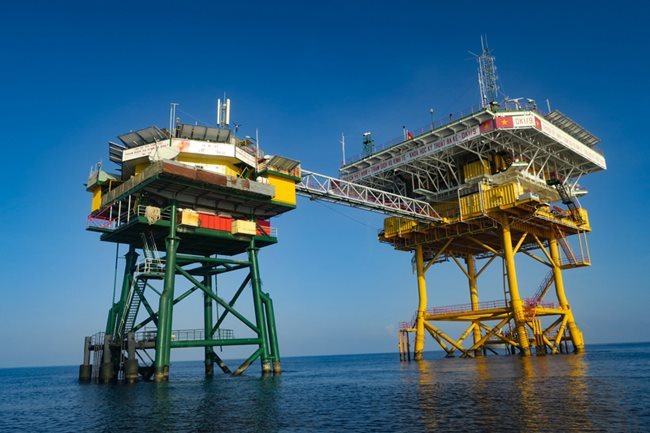 |
| A cluster of DK1 rigs within Vietnam’s 200-nautical-mile exclusive economic zone – PHOTO: NDO |
In an article on the Voice of Vietnam radio’s website, Le Nghiem, the former head of the Ministry of Information and Communications’ Department of External Information, cited Ministry of Foreign Affairs spokesperson Le Thi Thu Hang as saying that the Chinese vessels recently violated Vietnam’s EEZ and continental shelf in the south of the East Sea.
The area belongs to Vietnam, in line with the 1982 United Nations Convention on the Law of the Sea (UNCLOS), of which both Vietnam and China are members.
Violation of Vietnam’s sovereignty, jurisdiction
Under the provisions of the International Law on EEZs, the geological exploration of Haiyang Dizhi 8 in Vietnam’s EEZ violates almost all the provisions of the 1982 UNCLOS on the rights and obligations of related parties.
In case the vessel’s activity aims to explore oil and gas reserves at the seabed of the EEZ, which is also the continental shelf of Vietnam, it would be an infringement of Vietnam’s sovereignty rights.
If the geological exploration aims to undertake scientific research, whether for peaceful purposes or not, it would still violate Vietnam’s jurisdiction over its EEZ.
Also, it undermines the peace and security of the sea region and affects the freedom of travel and economic operations of Vietnam and other countries, which have obtained Vietnam’s permission to operate there.
Nghiem said that China does not have any legal waters overlapping with Vietnam’s DK1 rigs, including the Vanguard Bank. This is a marine area planned under the 1982 UNCLOS, and is not in dispute with any country, especially China.
The fact that China claims exclusive control over all waters inside a “nine-dash line” that passes through 60% of Vietnam’s sea is completely illegal and is not recognized by international laws. In other words, the recent violation turns Vietnam’s undisputed waters into a disputed area.
The arbitral tribunal’s verdict on a dispute between the Philippines and China, which is an international legal document that explains the 1982 UNCLOS, had flatly rejected the nine-dash line.
The tribunal had concluded that there was no legal basis for China to claim historic rights to resources within the maritime areas falling within the nine-dash line.
U.S. opposes Chinese interference in oil and gas activity in East Sea
In a statement on July 20, the United States Department of State has expressed concern over reports of China’s interference with oil and gas activities in the South China Sea (SCS), which Vietnam calls the East Sea, including Vietnam’s long-standing exploration and production activities.
“China’s repeated provocative actions aimed at the offshore oil and gas development of other claimant states threaten regional energy security and undermine the free and open Indo-Pacific energy market,” stated the department.
As U.S. Secretary of State Mike Pompeo said earlier this year, “by blocking development in the SCS through coercive means, China prevents ASEAN members from accessing more than US$2.5 trillion in recoverable energy reserves.”
China’s reclamation and militarization of disputed outposts in the East Sea, along with other efforts to assert its unlawful maritime claims, including the use of maritime militia to intimidate, coerce, and threaten other nations, undermine the peace and security of the region.
China’s growing pressure on ASEAN countries to accept the Code of Conduct provisions that seek to restrict their right to partner with third-party companies or countries further reveals its intent to assert control over oil and gas resources in the sea.
“The United States firmly opposes coercion and intimidation by any claimant to assert its territorial or maritime claims. China should cease its bullying behavior and refrain from engaging in this type of provocative and destabilizing activity,” the department stated. SGT
 Survey vessel Haiyang Dizhi 8 and other coastguard ships of China are operating around the Vanguard Bank in the East Sea, which is a blatant violation of international law as the area is within Vietnam’s 200-nautical-mile EEZ.
Survey vessel Haiyang Dizhi 8 and other coastguard ships of China are operating around the Vanguard Bank in the East Sea, which is a blatant violation of international law as the area is within Vietnam’s 200-nautical-mile EEZ.